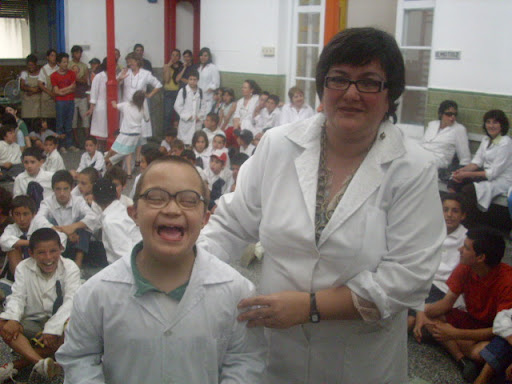Translated by Paul D. Spradling
Excellent video from Fernando da Rosa. He also wrote an article about the activities.
This was last activity of the year. We hope to continue our work late-January, and give the project everything it deserves!
Image 1: It was on our way out of the school, the bus driver hurrying the group of '83 volunteers so we could leave. Someone brought hot water to replenish the thermoses [to drink mate]. We were happy, talking about the gratifying moments we had experienced since morning. As we turn out of the driveway, we see a family sitting on the porche of their simple block house. The father was sitting on a low stool, his wife standing on his side, three children gathered around them, one of them still with their tunic. They watched with joy how their father explored the XO, one of the kids was thrilled to explain the basics. We weren't able to take a picture, but this memory will stay with us for ever.
Image 2: We were giving the first XOs to the kids in the school for disabilities. One of the volunteers stuck the labels and scanned the laptops; we called out the kids one by one to receive their laptop. We called for 'Juan'; the principal, with a big smile, said to us: "you'll see". From behind a steel column, in the roofed patio of the old house, emerged a little kid with big cheeks and glasses, tumbling around with a great big smile. Juan has Down's Syndrome. He's happy and you see it. Everybody can tell. He received his laptop and quickly and happily tumbled back to his place. Everybody cheered. It was a party!

Episode 04 takes us on location in Porto Alegre, Brazil. Where the first batches of XOs have been delivered and deployed. Meet the teachers using the laptops in the classroom. Where besides doing daily assignments on the machines, some students have already learned programing. Local culture has permeated the project, and as a veteran school principal explains, an improved education is set to equip a new generation of Brazilian citizens.
"This is the story of the little green laptop that could. Meet the faces behind the One Laptop per Child initiative and see what they do every day in the Cambridge, MA office. Sit in on a brainstorming session. And find out what you can do to help."
The university will support Project Ceibal, accompanying and contributing, with the end of improving opportunity and equality in the access to the new technologies to all children in the country; generating a profound change in education.
It is expected that students and staff of the university will participate, contributing their experience to facilitate the students, teachers and parents first encounter with this new tool (the laptop).
By means of an activity of mass participation throughout the university, it is expected to contribute essential elements to the formation of the university's students. Key elements include: closer contact with the reality of the country, development of communication and expression skills, and the horizontal link with students and staff of other faculties or mayors.
We hope to generate links that will potentially give birth to projects of development, content or that will contribute national know-how. It is expected from this experience, that some students will maintain contact with the schools that they visited and that development projects with social utility will surface.
We aspire for a project of mass participation by students and staff of a variety of carriers, which will develop throughout the year 2008 in which Project Ceibal will spread throughout all rural areas of the country.
Based on a question in an earlier post, I'm making some comments on the project's influence on students' motivation.
Motivation is hard to measure quantitatively. According to the headmaster at the Cardal school, there was never any problem with desertion or any high level of absenteeism, but the latter was reduced this year (i.e., the kids were absent less than in other years). The teachers also tell us that students seem more motivated and that, in particular, they enjoy it when it's time to work with laptops.
On the other hand, additional motivation comes up when the kids take their computers home and show their parents what they have done and what they have created. In this sense, there's generalized perception that the project is helping to bring families "closer" to the school. Edith Moraes, director of the grade school, says that she's very happy that a long-existing trend is reversing itself - where it seemed that the school was going down one path and families down another.
In any case, these results are extremely preliminary given that the Cardal experience has special qualities due to it's enormous level of exposure.
We could have a new reference point in the next few days, when massive laptop distribution begins in other schools in Florida.